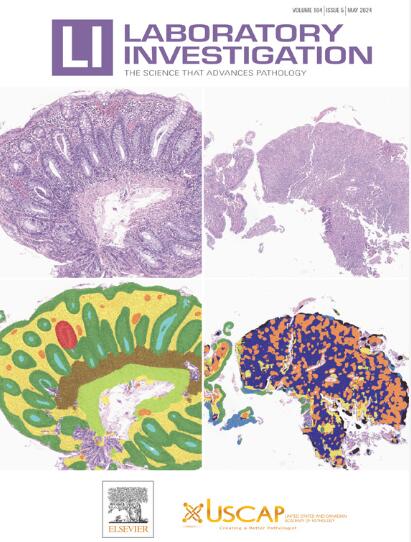肿瘤坏死因子-α依赖性炎症上调高迁移率基团框1,诱导肺腺癌的肿瘤促进和抗程序性细胞死亡蛋白-1免疫疗法的抗药性。
IF 4.2
2区 医学
Q1 MEDICINE, RESEARCH & EXPERIMENTAL
引用次数: 0
摘要
肿瘤相关的慢性肺部炎症依赖于肿瘤坏死因子(TNF)-α来激活多种细胞因子,这是炎症循环的一部分,在肺腺癌的肿瘤进展中起着关键作用。高迁移率基团框 1(HMGB1)是一种介导炎症的细胞因子。TNF-α诱导的炎症是否会调节HMGB1,从而导致肺腺癌的肿瘤进展和促进,目前仍不清楚。因此,研究人员利用人体样本和尿烷诱导的炎症驱动肺腺癌(IDLA)小鼠模型,探讨了HMGB1参与肿瘤发生、肿瘤进展和抗程序性细胞死亡蛋白(PD)-1免疫疗法疗效的情况。在人类肺腺癌中观察到,高水平的HMGB1与患者总生存率低有关。HMGB1的上调与TNF-α相关炎症和TIM3+浸润呈正相关。TNF-α 上调细胞内和细胞外 HMGB1 的表达,有助于体外促进 A549 细胞的肿瘤生长。通过使用尿烷诱导的IDLA小鼠模型,我们发现HMGB1的上调与TIM3+ T细胞浸润的增加有关。阻断 TNF-α 依赖性炎症会下调 HMGB1 的表达并抑制 IDLA 的肿瘤发生。单用抗-PD-1治疗并不能抑制TNF-α依赖性IDLA的肿瘤生长,而抗-PD-1联合TNF-α阻断则能克服抗-PD-1免疫疗法的耐药性。此外,抗PD-1联合抗HMGB1也能抑制IDLA的肿瘤生长,这表明TNF-α增加HMGB1的释放是IDLA对抗PD-1免疫疗法耐药的原因之一。因此,肿瘤相关的TNF-α依赖性炎症在炎症循环中上调了细胞内和细胞外HMGB1的表达,导致了肺腺癌的肿瘤促进和抗PD-1免疫疗法的耐药性。本文章由计算机程序翻译,如有差异,请以英文原文为准。
Tumor Necrosis Factor-α–Dependent Inflammation Upregulates High Mobility Group Box 1 To Induce Tumor Promotion and Anti–Programmed Cell Death Protein-1 Immunotherapy Resistance in Lung Adenocarcinoma
Tumor-associated chronic lung inflammation depends on tumor necrosis factor (TNF)-α to activate several cytokines as part of an inflammatory loop, which plays a critical role in tumor progression in lung adenocarcinoma. High mobility group box 1 (HMGB1) is a cytokine that mediates inflammation. Whether TNF-α–induced inflammation regulates HMGB1 to contribute to tumor progression and promotion in lung adenocarcinoma remains unclear. Thus, human samples and a urethane-induced inflammation-driven lung adenocarcinoma (IDLA) mouse model were used to explore the involvement of HMGB1 in tumorigenesis and tumor progression and efficacy of anti–programmed cell death protein (PD)-1 immunotherapy. High levels of HMGB1 were observed in human lung adenocarcinoma associated with poor overall survival in patients. HMGB1 upregulation was positively correlated with TNF-α–related inflammation and TIM-3+ infiltration. TNF-α upregulated intracellular and extracellular HMGB1 expression to contribute to tumor promotion in A549 cells in vitro. Using a urethane-induced IDLA mouse model, we found HMGB1 upregulation was associated with increased TIM-3+ T-cell infiltration. Blocking TNF-α–dependent inflammation downregulated HMGB1 expression and inhibited tumorigenesis in the IDLA model. Anti-PD-1 treatment alone did not inhibit tumor growth in the TNF-α–dependent IDLA, whereas anti-PD-1 combined with TNF-α blockade overcame anti-PD-1 immunotherapy resistance. Furthermore, anti-PD-1 combined with anti-HMGB1 also inhibited tumor growth in IDLA, suggesting that increased HMGB1 release by TNF-α contributes to the resistance of anti-PD-1 immunotherapy in IDLA. Thus, tumor-associated TNF-α–dependent inflammation upregulated intracellular and extracellular HMGB1 expression in an inflammatory loop, contributing to tumor promotion and anti-PD-1 immunotherapy resistance in lung adenocarcinoma.
求助全文
通过发布文献求助,成功后即可免费获取论文全文。
去求助
来源期刊

Laboratory Investigation
医学-病理学
CiteScore
8.30
自引率
0.00%
发文量
125
审稿时长
2 months
期刊介绍:
Laboratory Investigation is an international journal owned by the United States and Canadian Academy of Pathology. Laboratory Investigation offers prompt publication of high-quality original research in all biomedical disciplines relating to the understanding of human disease and the application of new methods to the diagnosis of disease. Both human and experimental studies are welcome.
 求助内容:
求助内容: 应助结果提醒方式:
应助结果提醒方式:


